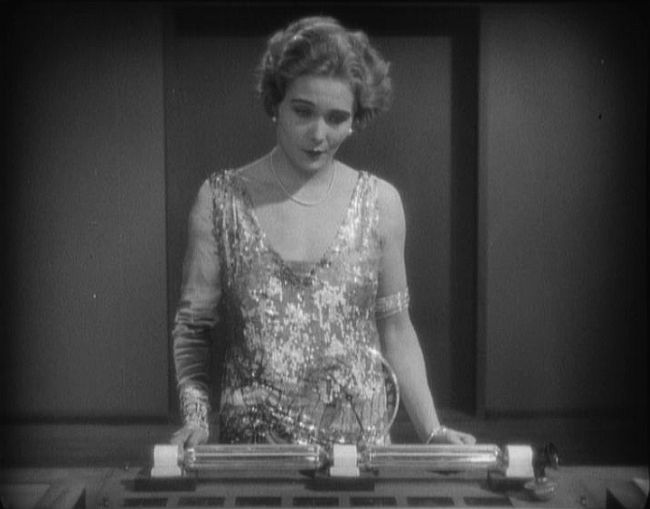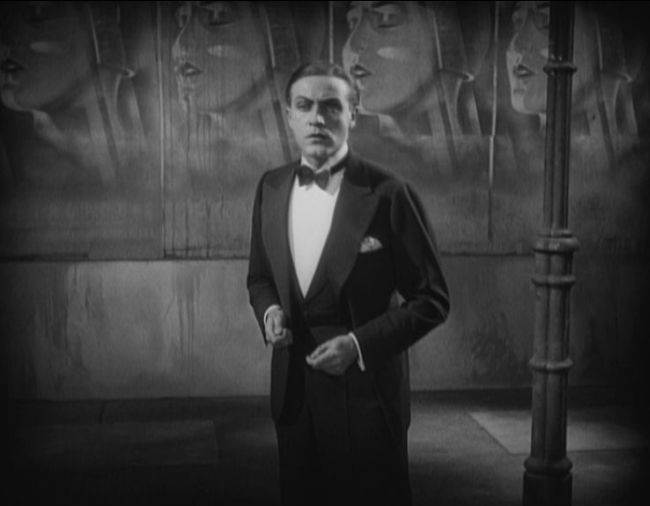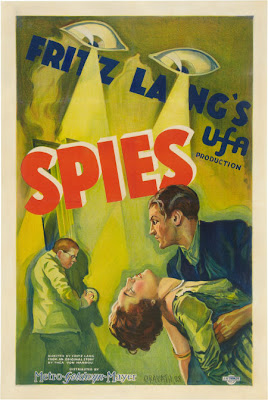Fritz Lang’s magnificent Spies (1928) is so obviously the precursor to the post-modern spy thriller that I can’t help but wonder why more people don’t discuss it. One of the things that is so fabulous about the film is that it rarely delves into stereotype, but that is most certainly because the now-well-known elements of the spy flick were fresh and new in 1928 and could hardly have been stereotyped at all. Yet the femme fatale, the Russian agent, the sneaky Asian spies, the fallen soldier, the cold-blooded spy ring leader, these were all familiar to 1928 audiences and could have all easily fallen into cliche, but they didn’t.
Which, to digress a bit, is why I was so put off by Donald Sosin’s score which is featured on the 2004 restoration. Every appearance of the Japanese spies — who are trying to get a treaty back to Japan before master German spy Haghi gets his hands on it — results in Sosin’s score switching to very stereotypical Asian music. When a main Japanese character dies, a gong is heard. It’s baffling.
About the same time as this restoration, Zach Galifianakis performed a now-famous joke in his stand-up act about this exact thing: “Whenever my Asian roommate walks in the door, I play [a stereotypical Asian tune]. And she says ‘Zach, why do you do that every time I come in the room?’ and I say ‘Because I don’t have a gong.'” It doesn’t make sense that Sosin would, in 2004, still use a variant of a musical stereotype that dates back to at least the 1940s, was a joke by the 1980s, and is now considered offensive.

In Spies, the beautiful, compelling, smart, sexy Gerda Maurus plays Sonja, Russian spy who works for evil mastermind Haghi (Rudolf Klein-Rogge) but falls in love with one of the good guys, No. 326 (Willy Fritsch). She gives an amazing performance here, and it doesn’t hurt that she has the most brilliant wardrobe I’ve ever seen. Gerda has shot right to the top of my pretend girlfriend list, with apologies to Joanna Pettet. Haghi wants Sonja for himself, so when he finds she’s in love with No. 326, he keeps her under lock and key while he plots to steal the Japanese treaty.

Meanwhile, No. 326 tries to find Haghi, Sonja, and the treaty by himself. This is all ridiculously exciting, and despite being over two hours long, it’s pretty fast-paced for Lang. Lang lingers; it’s just what he does. Here, though, it doesn’t bog the film down (I’m lookin’ at you, “M”), and the glorious visuals are well worth lingering on.

Lang also indulges in a little self promotion. You go ahead, Fritz. You’ve earned it.
 Woah! Huge slam on the U.S. tax system out of nowhere!
Woah! Huge slam on the U.S. tax system out of nowhere!
It’s just a few days before Giftmas and, since I was already there, I did a little shopping on the set of Spies, where I picked up:
 Fashionable thingiewhatsit dangly bit for the rear window.
Fashionable thingiewhatsit dangly bit for the rear window.
 A funky lamp! Kind of hard to find light bulbs that fit, though.
A funky lamp! Kind of hard to find light bulbs that fit, though.
 That clock you can barely see on Mabuse’s Rotwang’s Haghi’s desk. It’s terrific, though, all clear and round and with the kind of Euro-Deco font you can really sink your teeth into.
That clock you can barely see on Mabuse’s Rotwang’s Haghi’s desk. It’s terrific, though, all clear and round and with the kind of Euro-Deco font you can really sink your teeth into.
 A couple of sessy leatherboys. (I was running low.)
A couple of sessy leatherboys. (I was running low.)
…And now to stuff them all into my stocking.




I misread that as “sassy” leather boys.
I don’t take sass from my leatherboys.
This is my favorite Lang movie.
As for the stereotypical asian musical motifs, that’s what would have been done back in the day. I don’t have a problem with that.
The decor and clothing was fantastic, especially Sonja’s clothes.
A truly inventive take on one of my favorite Lang films: Fritz Rasp is my hero for playing some of the smarmiest characters in silent films with such restrained elegance. Have you seen THE SPIDERS, Lang’s take on the serialized films popular during the teens? They are interesting to observe the development of the idea of secret criminal societies, but they likewise perpetuate the link between crime and ethnicity (shame, shame). You know, I can’t help thinking that a girl always needs a “fashionable thingiewhatsit” when dealing with “sessy leatherboys”.
As for the stereotypical asian musical motifs, that’s what would have been done back in the day. I don’t have a problem with that.
Now that’s a shocker.
I wouldn’t mind “sassy” as long as it came along w/ “sessy”.
I always turn the volume down to zero for silent movies because I never like the modern scores. Spies is a terrific movie.
Amazon UK have some rather attractive prices on Region 2 DVDs of Lang’s movies at the moment. I’m sorely tempted to grab a couple.
Yes! If you like “Spies”, you’ll like “Spiders”.
Have agree about some modern scores for silents. I often turn it really low.
I watched lots of silents from one particular distributor who had the same score for every silent: Beethoven’s Pastoral Symphony. Quite a good generic choice especially when compared to some of the weird electronic scores.
Sorry you didn’t like the Asian stereotypes and gongs…it was definitely a nod to the practice of the time. I’m sure contemporary audiences have a hard time watching some Buster Keaton and Harold Lloyd movies too and seeing very politically incorrect scenes with people in blackface, and having various ethnic groups lampooned. But no one took offense then.
On the other hand, I have scored a number of Japanese and Chinese silent films and the request has been to write very Western 20’s music, as that was the practice in accompaniment for those films at the time. And then people comment, “It’s not Asian, it sounds too Western.”
So there is no correct answer. Turn down the music if you don’t like it, or find something else that works better for you. Mine is only one choice, and even that changes from performance to performance when I play these films live. I am currently scoring Lloyd’s NOW OR NEVER for a wind/brass octet, having done a piano score for the 2005 Kino release, and the music has nothing whatever to do with that earlier version.
The films will continue to be seen and rescored by each new generation, that’s one of the nice things about silent films.
Happy Holidays.
Donald Sosin
oldmoviemusic.com
But no one took offense then.
Sorry you didn’t like the Asian stereotypes and gongs…it was definitely a nod to the practice of the time.
Donald, thanks for stopping by.
I’m afraid the overly broad “no one took offense to racism back then” statement is absolutely incorrect. Don’t take my word for it, look up contemporary complaints about movies like “Birth of a Nation” or check out statements by actors such as Willie Best a.k.a. Sleep ‘n’ Eat. It was a different time in that racism was more overt and more common, yes, but it was critiqued even back then.
Before I go further, I want to say that I didn’t dislike your music. I’ve heard your scores before and never disliked them; in fact, I think you did the score for the TCM print of “The Blackbird”, right? Best thing about the movie was the score. But in this instance, it was a shocker to me to see a film that was so much LESS racist than U.S. films of the same time, only to have a subtly racist musical motif added to it. It was jarring and, to me, seemed really unnecessary.
I’m not sold on “no one cared back then” as a catch-all excuse for every instance of bigotry in films, either historic or current. And in this case, I’m concerned that no one who says “It’s just what they did back then” has even mentioned Werner Heymann’s original score. Did Heymann use stereotypical Asian music every time a Japanese spy was on the screen? I have only heard some of his sound film scores, never any of his silent scores, so I can’t even begin to guess.
Even if Heymann DID use stereotypical Asian motifs and gongs in the “Spies” score, I don’t understand why someone would make the choice to mimic that subtly racist practice today.
The only thing I can’t stand about the movie is Lupu Pick playing the Japanese agent. He doesn’t even look as realistic as Sidney Toler.
British actor/director Walter Forde did a wonderful parody in his 1929 silent WOULD YOU BELIEVE IT? The villain is dressed exactly like Haghi and sits at the same desk. It’s done exactly like Lang but after he gives his orders he presses a button and a sandwich and the racing form pops out of the desk. OK, that’s only a mild joke but how many other period parodies of Lang can you name? (I wish some studio had though of a 2 reed Metropolis parody)
Just telling me about the sandwich gag made me laugh. I’d love to see it.
My earlier reply got too long so I deleted it, but yeah, I had a paragraph in there about Romanian Lupu Pick as the head Japanese spy. The character wasn’t so bad, but Pick’s performance was… well, not good.
The funky lamp on police chief’s table caught my eye the very first time I saw this great film, I liked it so much that I’ve managed to get a replica.
A replica would be amazing.
I am like Brick in Anchorman: I LOVE LAMP.